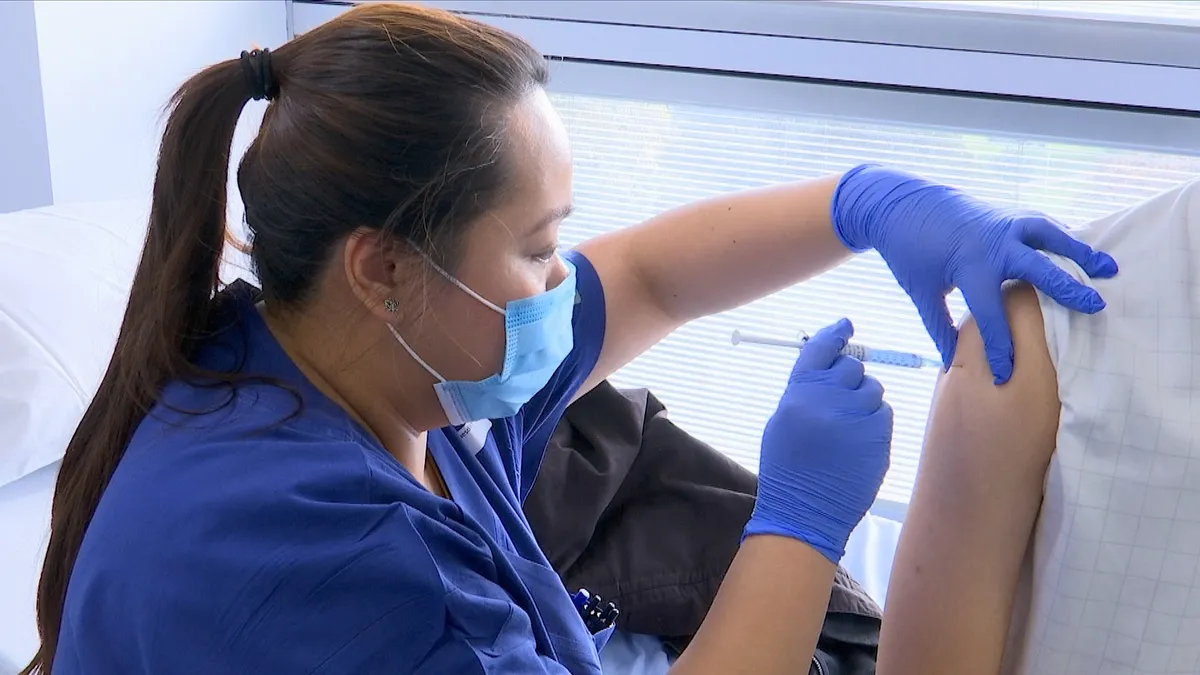Dive Brief:
- As employers decide how to navigate the gradual rollout of COVID-19 vaccines across the U.S., a survey of 1,000 workers by people analytics firm Perceptyx found respondents were divided over employer requirements that employees be vaccinated.
- Fifty-three percent of workers surveyed said employers should not require vaccination, and 60% of self-identified essential workers surveyed said they believed employers should not require employees to be vaccinated before returning to a physical workplace, according to Perceptyx. Moreover, 43% of all respondents said they would consider leaving their employers if they were required to be vaccinated.
- However, 53% of employees said they would "likely" receive a vaccine if it were available today, and 56% said they would do so if encouraged by their employers. An even greater share, 60%, would get vaccinated if their employers offered an incentive of $100 or more.
Dive Insight:
The survey results indicate the challenges HR departments face in counseling executives on planning for workforce vaccination campaigns, but they may also show that a strategy centered around providing incentives for vaccination could connect with employees more broadly than a vaccination mandate.
Several companies, many of which operate in industries deemed essential, have opted to pursue incentivization. Dollar General announced earlier this month that it would offer one-time payments to front-line, hourly employees to receive a completed vaccination but would not require vaccination. Grocery chains Aldi and Lidl announced similar plans in the days following Dollar General's statement.
Though the national rollout of vaccines is evolving, management-side attorneys who previously spoke to HR Dive generally cautioned against instituting vaccination mandates. A top concern impacting the ability of employers to issue such mandates is that many groups of workers may have legal protections that would exempt them from having to receive a vaccination.
Though the U.S. Equal Employment Opportunity Commission has said in guidance that employers may require proof that employees have received a vaccine, federal laws such as the Americans with Disabilities Act and the 1964 Civil Rights Act require employers to conduct an individualized assessment to determine whether a reasonable accommodation is possible in the event that an employee has a disability or a sincerely-held religious belief that would prevent them from receiving a vaccine.
Some business leaders have also voiced opposition to mandates. In a Dec. 17 statement, Richard Edelman, CEO of consulting firm Edelman, said he was "deeply uncomfortable" with compulsory vaccination and called on organizations to provide information and education around the different types of available COVID-19 vaccines, including dialogue about associated side effects.
"We should first try to persuade highest-risk employees, then some of whom are feeling young and immortal, others who are carrying historical burdens starting with Tuskegee and including many other incidents of bias in medical product testing and still others who are fearing the worst about the politicization of public health," Edelman said. "We will prompt a backlash among employees who feel cornered after being locked down or working on the front lines with inadequate protections."
Available research suggests that there are sizable groups of Americans who are inclined not to receive a COVID-19 vaccine. An analysis of data published in December by Pew Research Center found that 60% of Americans said they either "probably" or "definitely" would get a COVID-19 vaccine "if it were available today," an increase from Pew's previous research on the subject months earlier. Most, 75%, also said they have a "great deal" of confidence in the research and development process involved in creating vaccines. However, 39% of respondents said they "probably" or "definitely" would not get a vaccine.
Later research in December by the Kaiser Family Foundation (KFF) showed that 71% said they "definitely" or "probably" would get a vaccine. Vaccine hesitancy was higher among certain demographic groups — for example, 35% of Black adults said they "definitely" or "probably" would not get a vaccine, according to KFF, compared to 26% of White adults and 26% of Hispanic adults.
Perceptyx found in its survey that 60% of respondents said they were fearful of the potential side effects of a vaccine, but the company also found that 67% trusted the research and development of vaccines.
Vaccine availability, while critical to reopening plans, may not entirely change the measures employers have taken during the pandemic. A 2020 survey of HR leaders by Gartner found that 90% said their organizations planned to allow employees to work remotely at least part of the time even after a vaccine is widely adopted. But more than one-third said they may relax protocols such as mask-wearing. In guidance, the Centers for Disease Control and Prevention recommend that people who have completed a COVID-19 vaccination continue to wear masks and avoid close contact with others in order to help prevent spread of the coronavirus.













